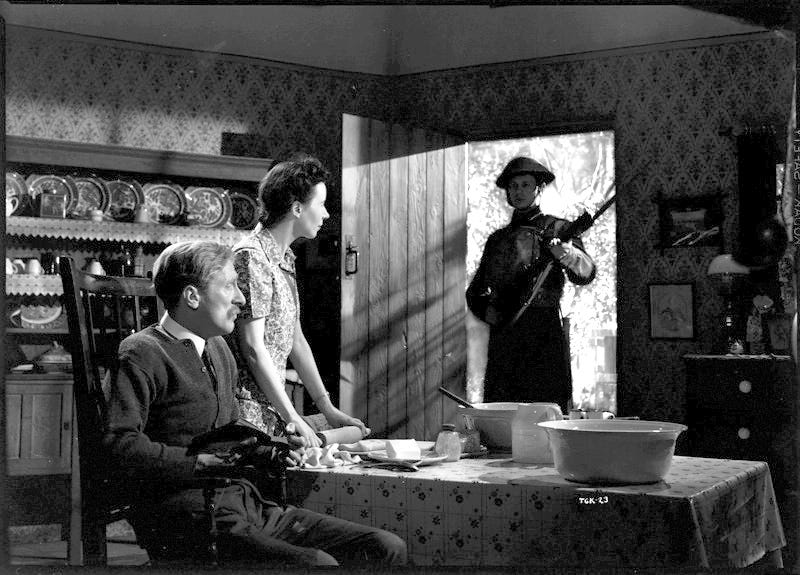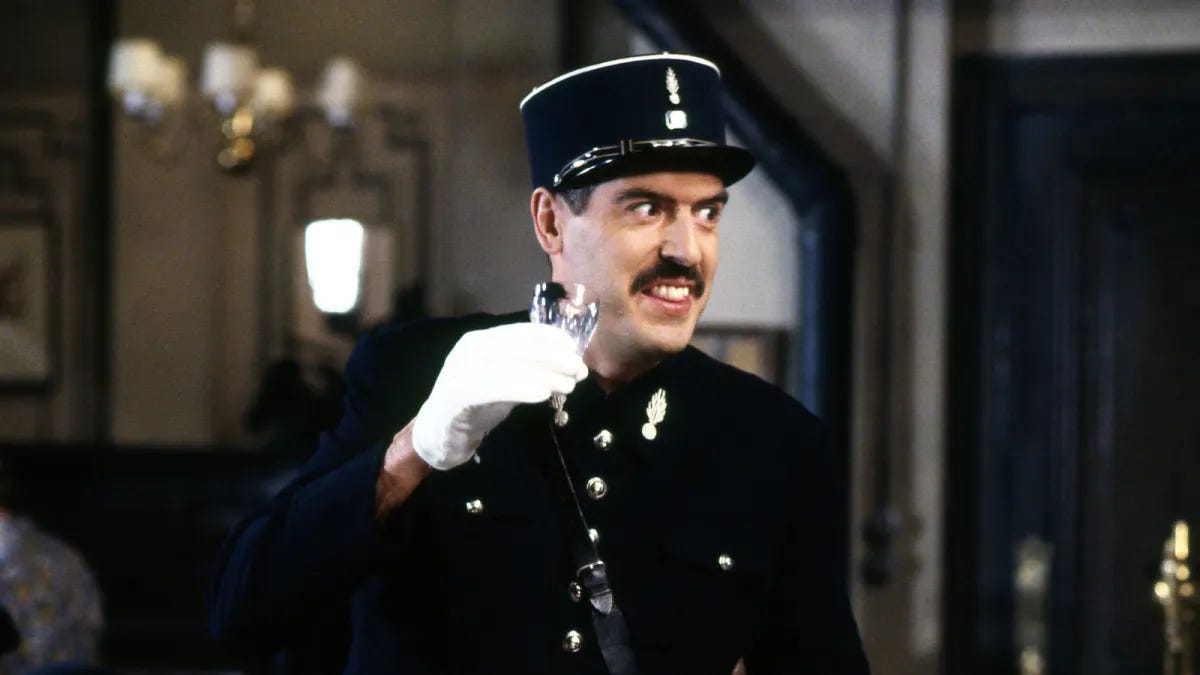I did Nazi that coming
FILM REVIEW: Went The Day Well?
Went The Day Well? is a 1942 not-official-British-propaganda film, based on a story by Graham Greene and directed by Alberto Cavalcanti, a Brazilian whose life is a story in his own right. It’s already a pretty well-known war movie—if not up there with the likes of Sands Of Iwo Jima or Colonel Blimp or Casablanca—but I realised soon after I dipped into it one day last week, that I hadn’t seen it before. In it, an almost-idealised south-of-England village is invaded by Germans and many of the invaders end up dead.
There are no spoilers in that previous sentence. The film’s framing device, narration from an imagined future village-church graveyard, makes all of this clear from the start. But it does not prepare you for everything you witness in the final act. If I tell you that the plot is ripe for a Tarantino retelling, that might hint at some of the flavours of its final course. Even if such a reboot never happens, it deserves, even at this late stage, to become a cult classic, and I’m puzzled that it hasn’t already.
If you’re at all interested in the British, especially the English, you should watch this film. The place and its people have, of course, changed hugely since it was made; but it captures so much of the essence of both how they still are and how they still see themselves that it’s a must-see. This isn’t to say that it’s perfect: Although many of the performances are fine drawings of modest lives lived bravely—moving pictures of courage—some of the acting, especially by the non-trained players deployed at points, is poor. But it is a perfect encapsulation of several particular kinds of Britishness. Indeed, the story wouldn’t work at all if the villagers weren’t undone at the outset by their plausible eagerness to offer temporary welcome1 to strangers, albeit British strangers who present themselves as conspicuously loyal to King and country.
It takes the escalation of the peril the locals find themselves in to drag them from their socially stratified politeness, and from their banter and their irony, into the sort of dark place where they resort to their ruthlessness and stubbornness and seriousness and bloody-mindedness.
“Good moaning”
Again, it’s no great giveaway to say that the Germans who invade the fictional village of Bramley do so by giving every impression that they’re natives. That they do so reminds me of the best running joke in 1980s UK sitcom ‘Allo ‘Allo: that the recurring character of Officer Crabtree, a British bobby working with the French Resistance has such a terrible accent when speaking French that all his (English-language) lines are spoken with the most contorted vowels possible.
This gag has multiple layers of irony:
‘Allo ‘Allo parodies the (apt) seriousness of wartime dramas like Secret Army, populated by clever and ruthless German invaders, in part by mocking the ineptitude of its own farcical Nazis, who are—inevitably, but generously—the butt of most of the jokes; some of the biggest laughs, however, are saved for the British characters—and the laughs work because of the richness and ambiguity of English vocabulary, as well as because English, very unlike German, is a most un-phonetic language.
The character was partly inspired by former UK Prime Minister Edward Heath, who spoke fluent French, but with a poor accent.
In real life, Arthur Bostrom, who plays Officer Crabtree is, in fact, fluent in French.
But, if you’re familiar with how Germans not native to the UK speak English, when you watch Went The Day Well? across the decades that have passed since its release, you can understand how it might have been possible for fake ‘Krauts to get away with it:
Even allowing for their being portrayed by trained actors, the upper-class characters in the film speak with close-to-RP accents—they make sounds that today’s correspondingly advantaged inverted snobs dare not.
Such accents boast vowels that are closer to those of Germans who’ve learned English as a foreign language (even today) than they are to the vowels spoken by most natives.
The accents of all the characters in the village vary widely, both by class and geographical origin2, again in a way that is far more pronounced than today.
So it’s not a huge stretch to imagine that, back in the early-to-middle 20th century, a small group of mildly-accented fluent English-speakers from Germany—or loyal to Germany/German family—could pass for Brits within an isolated village population, especially as self-proclaimed outsiders, who might have been privately educated. (This adds yet another irony to the ’Allo ‘Allo joke: actual Brits shown speaking English in the show speak it in RP.)
The Heart Of The Matter
The heroes of Went The Day Well? are both male and female, but one of the most interesting things about the film is how conventional the depictions of male heroism are next to the well-acted complexities of the sacrifices of the film’s inadvertent warrior women. In such a traditional and “respectable” setting, the female characters not only have to overcome their physical fears, but are forced by extreme circumstance to break through the societal constraints placed on their sex and face horrors that they would not have been expected to (though a farming environment like this one would present its residents with more direct experience than most of the bloodier side of life).
You expect a straightforward plot from a work of this vintage; but it disappoints almost spitefully, as the hopeful plans of our plucky protagonists to summon aid are frustrated. You expect one early death to be the setting of an example both by the German hostage-takers for the captured villagers and for the audience by the filmmakers, merely to remind us of the stakes. It is not. It is the first of so many deaths that, unusually even for now, we cannot trust that anyone we have identified with will live to see the end of the weekend invasion it depicts.
I’m not enough of an expert on cinematography to be sure, but I couldn’t help mentally pigeonholing the lighting and composition of many of the shots as “film noir”. It certainly exploits both darkness itself, and sharp contrasts between darkness and light, as well as combinations of foreground and background to paint the drama of some of the most gruelling set-pieces as starkly as possible.
However gloomy aspects of this adaptation are, the film is a long way from Greene’s original story, in which it’s not the collective efforts of the villagers, and certainly not the martydom of certain of their womenfolk, but the actions of a lone-and-lawless outsider that are most important to defeating the invaders.
Again, this template is somewhat un-Greenesque (and would be perfect for Tarantino); but, despite discarding this more-subversive plot, the transformed work remains shocking.
The film guides always qualify their description of Went The Day Well? as “propaganda”, because its production does not meet that definition; but the film-as-art cannot be classified as pure propaganda also because, if it has a message, it’s not merely one of inevitable victory through heroism; it tells us baldly that no one can be trusted, that averting defeat carries a terrible price in pain and blood, that everyone—man, woman and child—must make sacrifices, and that fortune does not always favour the brave or the virtuous.
How you can watch it
You can watch Went The Day Well? free with a trial subscription to Studio Canal. or you can buy the BFI restoration on Blu-ray disc.
The word “temporary” is chosen with care.
The script even hangs a lampshade on this, by having a character with a north-west-of-England accent reminisce about nights out in her hometown.





I'd say it's definitely achieved cult status; my wife recently mentioned Thora Hird with a machine gun in reference to something else. The Secret Village by Humphrey Jennings is another Nazis in Britain film made during the war, transposing the Lidice massacre to Wales. Cavalcanti and Jennings worked together at thr GPO Film Unit.
I find the scene of the Postmistress killing her guard really shocking, even now. I think it still holds up very well overall. And it appears to have heavily influenced/inspired The Eagle has Landed. Bramley End may be a nostalgic romanticised glimpse of a bygone England, but there’s pure evil there!